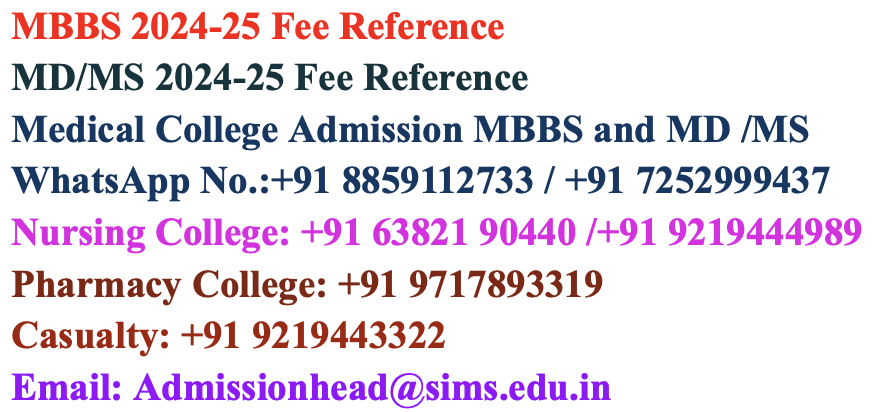


PARA CLINICAL - Pathology
- Introduction
- Curriculum
- Facilities
Introduction
Pathology is the scientific understanding
of the genesis of the disease and its structural changes.
The ultimate aim is to give a final diagnosis which will lead
to proper treatment and care. Here at SIMS we have full fledged & well
equipped pathology department, providing both diagnostic & teaching facilities.
The dept offers both undergraduate and post graduate studies. There are state of the art
lecture theaters with capacity for 150-200 students. We have museum displaying more than 250
specimens and practical & research laboratories for U.G. & P.G. students.
Curriculum
The teaching program consists of didactic lectures, supported by clinical training. These are further supplemented by modern teaching methods like Problem-Based Learning or PBL,
where the students are encouraged to think for themselves and find solutions.
For M.B.B.S. students, pathology is taught during the third,
fourth and fifth semesters for a total period of 18 months. Students are evaluated
internally, twice a semester. The program involves some of the best professors and has
the backing of good facilities to experiment in.
Facilities of Department
The department carries out various investigative procedures in following laboratories for patients in OPD/IPD.
- Histopathology including facilities for frozen section
- Cytology–exfoliative cytology including PAP smears, FNAC, Body fluids etc.
- Haematology – all haematological investigations including bone marrow examination.
- Clinical pathology- urine examination, semen examination etc.
- Research lab- facilities for IHC
- Blood bank- whole blood & its components
Research
- Each of the faculty members have several publication in indexed national journals. Currently following research projects are going on in the department.
- Array of cytological diagnosis in head and neck FNAC in rural population of western U.P.
- Cytological profile of PAP smears in a population between 20-70 years in a rural settings.
- Prevalence Seropositivity of transmissible diseases among blood donors in western U.P.
- Hematological alteration in smears/serologically positive cases of malaria.
The faculty members have vast teaching experience of teaching both under graduates and post graduate students. Several papers & research articles have been published in both international & national journals by the faculty.
Special achievements
- The department has been recognized by MCI for four post graduate seats /per year in year 2014.
- Recently conducted CME on ‘Blood component therapy’ in March 2014 for which 4 credit hours were awarded to each participant by U.P. Medical council.
Copyright © 2015 sims.edu.in | All Right Reserved